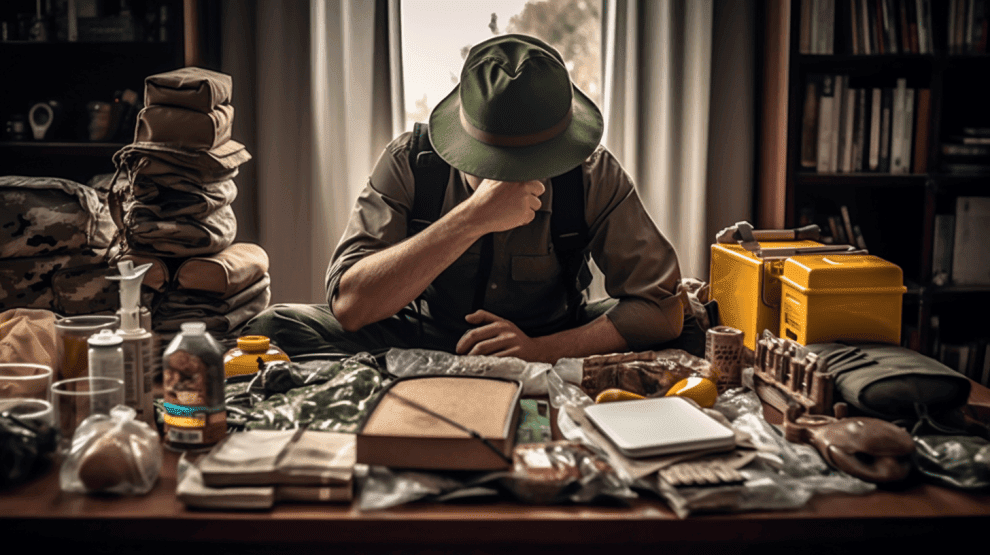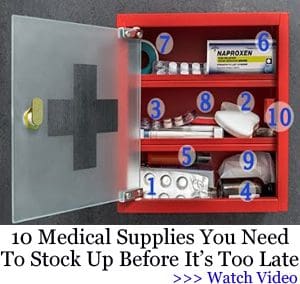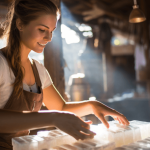Should I Start Prepping?
In recent years, I’ve noticed a growing interest in prepping as a way to prepare for potential emergencies, disasters, and survival scenarios. Hearing about various global events and the unpredictability of life has led me to consider if I should start prepping too. It’s important to understand that prepping isn’t necessarily about doomsday scenarios; it can be a practical approach to preparing for any situation where essential resources may be scarce, allowing me and my family to maintain our safety and well-being.
I’ve come to learn that starting prepping involves a thoughtful assessment of risks and needs, and gradually building a supply of emergency resources, such as food, water, and first aid essentials (Emergency Prep Guy). Developing a plan to communicate with family members and identifying safe locations for various threats is also a crucial aspect of prepping. As I explore the idea of prepping, it’s important to remember that the focus should be on taking manageable steps and making informed decisions to create a sustainable preparedness plan.
Why Prepping Matters
As someone who has experienced firsthand the challenges that come with unexpected situations, I cannot emphasize enough the importance of being prepared. In this section, I will discuss why prepping matters for various scenarios such as natural disasters, economic collapse, civil unrest, terrorist attacks, and health emergencies.
Natural Disasters
In my experience, natural disasters like hurricanes, earthquakes, and floods can strike unexpectedly and leave behind a trail of destruction. Prepping helps me to be ready for these events, minimizing the potential damages and ensuring the safety of my loved ones. For example, having an emergency kit at home and knowing evacuation routes can be the difference between life and death during events like Hurricane Katrina.
Economic Collapse
An economic collapse can lead to widespread job loss, a decrease in the value of currency, and even a shortage of essential goods. By prepping, I am able to decrease my reliance on external systems and increase my chances of survival during such periods. This includes having a stockpile of non-perishable food, water, and basic necessities. This helps me avoid panic-buying during a major disaster.
Civil Unrest
In times of civil unrest, public services may break down, and it may become difficult to access basic necessities. By preparing for such eventualities, I can ensure that my family and I have access to adequate resources and a safe place to stay. Prepping also helps me to be ready for potential personal security threats during times of unrest.
Terrorist Attacks
Although the chance of being directly affected by a terrorist attack is low, the possibility still exists. I believe it is important to be prepared, including knowing how to respond in case of an emergency and having a plan for communication, evacuation, and medical aid if needed. This mindset helps me to feel more confident and in control during potential crises.
Health Emergencies
Health emergencies can range from personal medical issues to widespread pandemics. In such situations, prepping can help me to be better prepared for potential shortages of medicine and medical supplies. For example, having a stock of essential blood-pressure medicines for a family member can be a lifesaver. Additionally, adequate knowledge of disease control measures can help to reduce the risk of contagion during a health crisis.
Getting Started with Prepping
As a prepper, I’ve learned that the journey to being better prepared for emergencies and disasters starts with taking small but important steps. In this section, we’ll explore how to assess your situation, create an emergency preparedness plan, and build your knowledge and skills.
Assess Your Situation
The first step in prepping is assessing your situation and identifying the most likely threats that you and your family may face. This involves considering factors such as your location, the environment, and any specific needs that your family members might have. Keep in mind that emergencies can happen at any time and it’s a good idea to have a plan in place for various situations.
A lot of people might feel overwhelmed at first, but remember that the goal is to establish a solid foundation for your prepping journey. It’s important to focus on the most critical needs first, such as water, food, and shelter, before moving on to the next steps in your preparedness plan.
Create an Emergency Preparedness Plan
Once you’ve assessed your situation, the next step is to create an emergency preparedness plan. This plan should include vital information, such as communication strategies, safe locations suited for different threats, and methods for avoiding or mitigating potential dangers. Make sure to discuss these plans with your family members and ensure that everyone knows their roles and responsibilities in an emergency situation.
Building a well-rounded emergency preparedness plan takes time, but it’s definitely worth the effort. By investing some time now, you’re setting yourself up for a more secure future in the face of unexpected events.
Build Your Knowledge and Skills
While gathering supplies and making a plan are critical steps in prepping, it’s also essential to build your knowledge and skills. Learning about different aspects of emergency preparedness can help you better adapt to various situations and increase your chances of survival. Some skills recommended for beginners include first aid, outdoor survival, and emergency communication.
One of the best ways to gain knowledge is by connecting with like-minded people in the prepping community. You can learn from experienced preppers by joining local groups or online forums. Integrating yourself into the prepping world will not only help you build your skillset but also provide a valuable network of support.
Essentials of Prepping
In this section, I’ll discuss the essentials of prepping: water storage and purification, food storage, medical supplies and first aid kits, and shelter and security.
Water Storage and Purification
The most important thing to consider when prepping is having a reliable water supply. An individual needs at least one gallon of water per day, so it’s crucial to store enough water for everyone in your household for at least two weeks. Additionally, having a water purification method such as purification tablets, a water filter or a boiling setup is vital to ensure access to clean water in case the stored water runs out or becomes contaminated.
Food Storage
Storing enough food for your household is another essential aspect of prepping. For a start, consider having at least a two-week supply of non-perishable food items such as canned goods, dried fruits, nuts, and grains. It’s also wise to rotate your food stores by consuming and replacing older items to maintain freshness and prevent spoilage.
Don’t forget to consider dietary needs and preferences of your household members, and make sure to include some comfort foods to help boost morale during a disaster scenario.
Medical Supplies and First Aid Kits
Having a well-stocked first aid kit and adequate medical supplies is crucial for addressing injuries, managing chronic conditions, or handling a potential health crisis. Key items to include in your first aid kit are bandages, antiseptics, pain relievers, tweezers, scissors, and prescribed medications for your family members. It’s also a good idea to have a basic understanding of first aid procedures in case professional help is not readily available.
Shelter and Security
During a disaster, having a safe place to stay and ensuring the security of your home is vital. Invest in reinforcing doors and windows and create a designated safe room in your house. As for on-the-go protection, a bug-out bag or get-home bag should be prepared for each of your household members. This bag should contain basic needs such as shelter, warmth, hygiene items, and personal protection gear like a whistle and a flashlight.
Don’t forget to develop a family emergency plan that includes communication, meetup points, and evacuation routes to help keep everyone on the same page and increase the likelihood of staying together and staying safe during a disaster.
Preparing for Specific Scenarios
In my journey towards becoming a better prepper, I’ve realized the importance of preparing for specific scenarios. By doing so, I can ensure that I have the necessary resources and knowledge to handle a variety of emergencies. In this section, I’ll discuss how to cope with power outages, handle natural disasters, survive civil unrest, and deal with economic collapse.
Coping with Power Outages
Power outages can range from a minor inconvenience to a life-threatening situation, depending on the duration and time of year. In order to better prepare for such an event, I have stocked up on a variety of supplies such as:
- Non-perishable food
- Bottled water
- Battery-powered or hand-crank radio
- Flashlights and extra batteries
- Warm clothing and blankets
I also have a portable generator that can provide temporary power to essential appliances. More importantly, I’ve learned how to safely operate it to avoid carbon monoxide poisoning and other hazards.
Handling Natural Disasters
Natural disasters such as hurricanes, earthquakes, and floods can strike unexpectedly. To ensure my personal safety during these events, I’ve familiarized myself with the specific hazards associated with each type of disaster. This includes:
- Creating an evacuation plan
- Assembling a well-stocked disaster supply kit
- Investing in appropriate insurance coverage
- Implementing home improvement measures to reduce potential damage
For example, after witnessing the devastation of Hurricane Katrina, I’ve taken the necessary steps to protect my home from floods and facilitate evacuation if necessary.
Surviving Civil Unrest
Whether it’s due to political turmoil, economic hardship, or a terrorist attack, civil unrest can create dangerous and chaotic conditions. In such situations, it’s essential that I have a plan to protect myself and my family, such as:
- Staying informed through reliable sources
- Keeping a low profile and avoiding confrontations
- Having a designated safe room within my home
- Stocking up on necessary supplies for personal defense and self-sufficiency
Dealing with Economic Collapse
An economic collapse can result in high unemployment rates, inflation, and a shortage of essential goods and services. To safeguard against this possibility, I’ve taken measures to protect my financial well-being and ensure that I can still provide for myself and my family:
- Maintaining a diversified investment portfolio
- Reducing debt and increasing savings
- Stockpiling essential goods such as food, water, and medicine
- Developing skills that would be valuable in a barter economy
By preparing for these specific scenarios, I feel more confident in my ability to face whatever emergencies may come my way.
Advanced Prepping Topics
As I progress in my prepping journey, I’ve delved into more advanced prepping topics to be well-prepared for various scenarios. In this section, I’ll share useful information on building a bug out bag, developing an evacuation plan, and exploring off-grid living and self-sufficiency.
Building a Bug Out Bag
A bug out bag is an essential item for many preppers, as it contains critical supplies needed to survive a short-term emergency. The most important thing to consider when building a bug out bag is to ensure it has the necessary items for your specific needs. Some essentials include:
- Water and a filtration system
- Non-perishable food
- First aid kit, including any necessary medications, such as blood thinners
- Emergency shelter, such as a tarp or tent
- Heat source, like a fire starter or portable stove
- Clothing and footwear suitable for your area’s climate
Remember that a bug out bag should be lightweight and portable since you may need to travel a considerable distance during an emergency or SHTF situation.
Developing an Evacuation Plan
A crucial part of being prepared is having an evacuation plan in place for various emergencies. An effective evacuation plan should include:
- Identifying safe locations for each type of disaster or emergency
- Designating meeting points for family members if you’re separated
- Establishing clear communication methods and backup plans
- Factoring in the needs of your pets or livestock
- Keeping vehicle fuel topped off and having a well-maintained “get home bag” in case of emergencies while away from home
Regularly review and practice the evacuation plan with all family members to ensure everyone understands their roles and responsibilities.
Off-Grid Living and Self-Sufficiency
For many preppers, off-grid living and self-sufficiency are appealing alternatives to relying on mainstream society. Some methods of achieving self-sufficiency include:
- Growing your food and storing enough water
- Creating renewable energy sources, such as solar or wind power
- Building underground bunkers or other alternative shelters
- Learning essential skills, like hunting, fishing, and tool-making
While achieving full self-sufficiency may not be possible or practical for everyone, adopting some off-grid living strategies can significantly improve your preparedness for unforeseen events.
Common Prepping Mistakes and Misconceptions
Focusing on Doomsday Scenarios
As I ventured into the world of prepping, I realized that many people concentrate on preparing for extreme, doomsday scenarios like nuclear war or a zombie apocalypse. While these situations can be fascinating, they often draw attention away from the practical and more likely emergencies we face on a daily basis, such as natural disasters or job loss. Backdoorsurvival highlights the importance of planning and developing a survival mindset for practical situations rather than focusing solely on extreme scenarios.
Overlooking Everyday Emergencies
While it’s fun to imagine surviving a doomsday scenario, it’s essential to remember the more common emergencies that can occur during everyday life. For example, during my junior year of high school, there was a severe storm that caused a prolonged power outage. While it wasn’t a doomsday event, my family and I still needed to have enough food and supplies to sustain us during that time.
Having emergency supplies on hand, such as food stores, water, and first-aid kits, is a great way to prepare for everyday emergencies. Ordinary situations like storms or flooding can occur at any time, and being prepared for them is just as critical as prepping for more extreme events.
Neglecting Mental Preparedness
Beyond physical preparations, I’ve learned that mental preparedness is a crucial aspect of prepping that is often overlooked. If an emergency were to happen, it’s vital to remain calm and think clearly to make the best decisions for survival. One way to stay mentally prepared is to practice staying calm in high-stress situations on a daily basis.
Another aspect of mental preparedness is having a clear understanding of your physical needs and capabilities. It’s essential to know how much food and water the average person needs per day, as well as how long certain supplies can last. As Tactical.com points out, not preparing enough water can be a significant mistake.
Lastly, it’s important to maintain a positive attitude during emergencies. To help with this, I ensure that my emergency supplies include items for entertainment, such as board games or books, to keep morale high and reduce stress during challenging situations.








